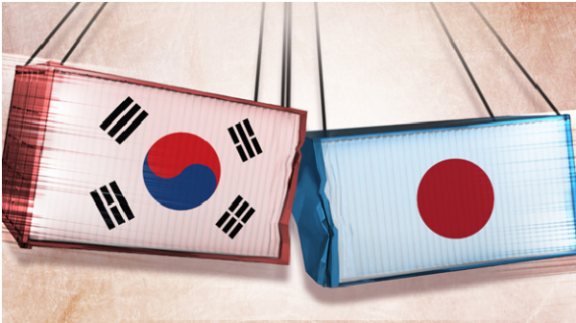South Korean and Japanese Governments on a Collision Course

The trade disputes between South Korea and Japan resulted from political managerial mistakes over those historical issues by both governments
The normalization of diplomatic relations between South Korea and Japan commemorated its 55th anniversary on June 22. Still, the bilateral relations are currently the worst on the economic and national security sides as well as the history side.
The Japanese government implemented export restrictions one year ago after the South Korean Supreme Court’s ruling on forced wartime labor. The restrictions covering three semiconductor and display materials, however, led to South Korea’s efforts for substitute development and more and more South Korean companies are standing on their own feet to the point of the restrictions being criticized by none other than Japanese news outlets.
At present, the issue is developing in the WTO. The Japanese government continued to ignore the South Korean government’s call for withdrawal of the measure, and then the latter sent the WTO a panel installation request on June 18. Previously, it suspended its WTO litigation procedure and opted not to terminate the GSOMIA in November last year. The request means that there will no longer be such appeasement gestures.
More recently, the Japanese government objected to the United States’ plan for G7 expansion to include South Korea, Australia, India and Russia, making an issue of the Moon Jae-in administration’s friendliness to China and North Korea. It is true that the administration’s pro-North stance is something worrisome, and yet the term of the current administration is about to end, and the administration and the country need to be distinguished from each other.
The South Korean and Japanese governments’ behaviors are unacceptably pathetic in view of mutual interests that they could achieve by cooperation amid the massive economic impact of COVID-19 and the fast-changing international political dynamics in Northeast Asia. According to the Federation of Korean Industries, collaboration between South Korean and Japanese companies in the material, component and equipment industries would result in no less than 136 trillion won (around US$105 billion) in added-value newly created in both countries’ manufacturing sectors as of 2018. “China is likely to benefit the most from the ongoing trade disputes between South Korea and Japan and its GDP is estimated to increase 0.5 percent to 0.7 percent based on the disputes,” it explained, adding, “In the global electrical and electronics industry, which has been led by South Korea and Japan, China’s production will increase 2.1 percent while those of South Korea and Japan fall 20.6 percent and 15.5 percent, respectively.”
The two countries are currently on a collision course despite the fact that the two governments’ insistence is of no practical use. The value that the South Korean government can achieve by turning assets confiscated from Japanese companies into cash based on the Supreme Court ruling is just limited to judicial reconfirmation of the illegitimacy of the Treaty on Basic Relations between the Republic of Korea and Japan signed in 1965. On Japan’s part, its past colonial rule in the Korean Peninsula is an unchangeable fact of atrocity even if the South Korean government does not turn the assets into cash.
In the end, their bilateral relations can be improved only after their historical issues are properly addressed. The trade disputes resulted from political managerial mistakes over those historical issues. Trade-based response to the political and diplomatic failures means nothing but how unwilling both governments are to bring their relations back to normal.